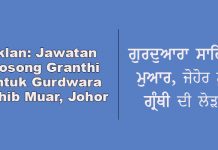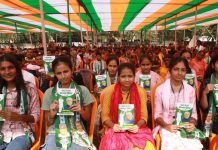
By Harmeet Shah Singh | Opinion |
India’s Bihar has delivered a result that looks regional but speaks far beyond its borders.
Patna, the birthplace of Guru Gobind Singh Sahib, sits at the centre of the present-day eastern state that has chosen a coalition built on widening support.
Analysts often dwell on Bihar’s caste blocks. These patterns still matter, but the verdict mirrors a wider shift.
The political right is redrawing democratic maps across continents.
President Donald Trump’s resurgence in the United States. The pull of Nigel Farage and Tommy Robinson on British policy under Prime Minister Keir Starmer. Prime Minister Narendra Modi’s Bharatiya Janata Party and its National Democratic Alliance shaping India’s political climate. Different countries. Same direction of travel.
Social media once promised openness. It instead forged sharper identities and rewarded leaders who thrive in polarised environments.
Public sentiment now moves like a firm current. It draws people toward nationalism and muscle.
Rahul Gandhi in India and Zohran Mamdani in New York represent contrasting models of political presence. One seeks acceptance through moderation. The other represents a different latitude of politics. Neither model alone can navigate the rising tide of majoritarian power. They answer to local constituencies. Supremacist politics, however, listens to a wider frequency.
Bihar reflects this unambiguously. Voters credited new roads, reliable power, construction-led jobs and a sense of identity that stretched beyond caste.
They sensed an upward shift, however minimal, and reinforced the leadership that delivered it.
Across the world, majorities tend to consolidate when they perceive movement in their favour. Bihar shows it in real time.
Lessons from Bihar
Voters responded to what they could see and touch. They recalled a Bihar where electricity faded a few miles from Patna and roads failed without warning. They now travel on improved highways, witness new power plants and see the first signs of industry after decades of drift.
Therefore, they back the structure they could see taking shape, rather than short-lived slogans about vote theft, caste counts or anti-capitalist attacks on establishment-aligned tycoons. When people sense even modest improvement, they guard the engine that creates it. This instinct repeats itself across democracies.
American voters back leaders who promise fortresses and revival. British voters respond to nationalism framed as recovery. Indian voters support a blend of pride and central authority. Bihar fits that global script.
Sikhs in This Climate
For Sikhs, this moment demands careful reading. The political right governs or influences many places where Sikhs live or seek to build futures. It shapes immigration, policing, national security and public perception. A careless act in one country or region can spark consequences in another. The world now operates like a single acoustic chamber.
The episode in the United States earlier this year exposed the scale of this challenge. Trump’s action against undocumented immigrants became a show of force.
Visibly identifiable Sikhs were filmed without turbans, handcuffed, and flown to Amritsar on a military aircraft. The images were stark. But the wider Sikh community in the United States did not respond with the force it often shows on civil liberties in India. Sikh lawmakers and activists across the Anglosphere stayed restrained.
Communities often retreat when they fear political cost. Many may not feel immediate empathy for new migrants labelled Fresh Off the Boat. Others may worry that speaking out invites the attention they hope to avoid. These choices reflect the pressures of the political moment.
The Price of Selective Caution
But caution, when selective, creates a dilemma. When a community exercises restraint during a moment of public humiliation, it cannot then use reckless rhetoric in other theatres.
Words travel quickly. They cast long shadows. A statement made in one city can unsettle conditions in another.
Authorities, political actors and media outlets track such moments closely. The consequences often fall on families far removed from the original event.
This is the responsibility facing visible minorities, Sikhs included. It is a call for strategic thoughtfulness, and not silence. Communities must judge when to speak and how to shape their argument.
The political right studies minority behaviour with precision. It uses misjudged reactions as material for its own narratives. This pattern now shapes the era we inhabit.
Bihar’s vote confirms that majoritarian consolidation will endure. It is not a passing phase.
As majority communities organise around ideas of order, identity and protection, minorities must refine their instincts. They need disciplined communication. They need to limit internal noise. They need to avoid steps that create risk for another Sikh a continent away who shares their appearance or articles of faith.
A New Vigilance
Influencers, organisers and digital voices carry significant weight. Their words move fast. Their messages can alter sentiment far beyond their intended audience.
Responsibility should feel like awareness, not constraint. This is the reality of the age.
Bihar’s result is part of a wider story. Major identities are hardening across continents. These shifts are shaping the rules under which minorities now navigate public life.
Sikhs have endured intense pressure in history. Their strength is intact. What this moment requires is judgement suited to the times.
Navigating the supremacist right calls for steadiness and foresight. It calls for the courage to measure one’s own voice. And this is the task of our time.

Harmeet Shah Singh is a career journalist currently serving as Communications and Advocacy Director at UNITED SIKHS (UK), a charity registered in England and Wales.
* This is the opinion of the writer and does not necessarily represent the views of Asia Samachar.
RELATED STORY:
The Demise of the Akali Dal and the Badal Dynasty: What Next for the Panth? (Asia Samachar, 5 Aug 2024)
ASIA SAMACHAR is an online newspaper for Sikhs / Punjabis in Southeast Asia and beyond. You can leave your comments at our website, Facebook, Twitter, and Instagram. We will delete comments we deem offensive or potentially libelous. You can reach us via WhatsApp +6017-335-1399 or email: asia.samachar@gmail.com. For obituary announcements, click here

































